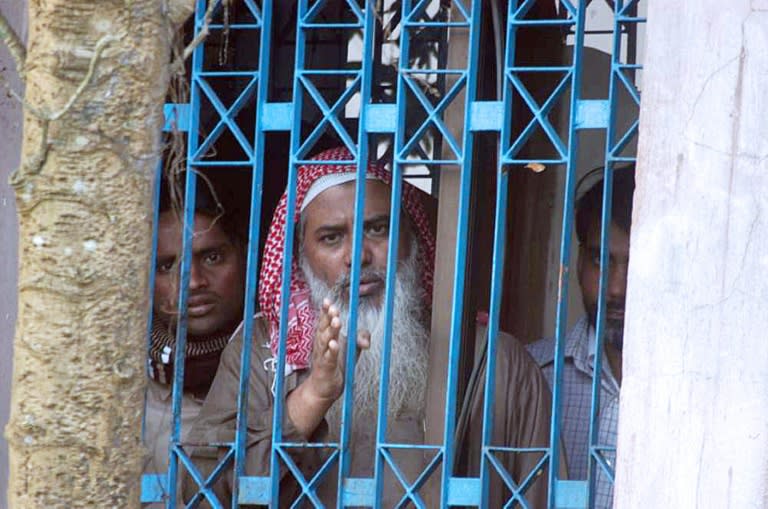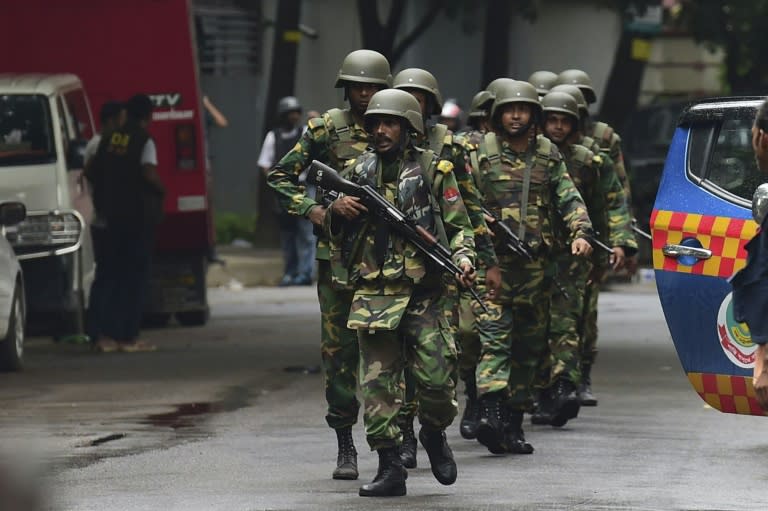Bangladesh says head of group blamed for cafe siege dead
The head of a Bangladeshi Islamist group accused of staging a deadly siege at a cafe and the killing of several foreigners died while trying to evade arrest earlier this month, security officials said Friday. Abdur Rahman died in hospital on October 8 after jumping from the fifth floor of a building on the outskirts of Dhaka during a raid by the Rapid Action Battalion (RAB), an elite security unit. The identity of Rahman, who was leader of the Jamayetul Mujahideen Bangladesh (JMB), was later confirmed through his possessions and by his family, who were shown pictures of his body, the RAB said in a statement. Several documents, letters and emails that were later retrieved by the RAB "all proved that Abdur Rahman was the emir (head) of the new JMB", the statement added. Bangladeshi authorities are insistent that the JMB was behind a siege at an upmarket cafe in Dhaka on July 1 in which 20 mostly foreign hostages were killed, even though the Islamic State group claimed responsibility. The RAB said that some of the documents recovered during their raid had been signed by Rahman using the alias Sheikh Abu Ibrahim al Hanif. While the statement made no mention of IS, the April issue of Dabiq, a magazine affiliated to the organisation, reported that Shaykh Abu Ibrahim Al Hanif was the jihadists' "emir" in Bangladesh. A RAB spokesman refused to comment on whether the two were the same men. RAB, which is tasked with tackling militancy and serious crimes, has listed 19 attacks carried out by the JMB, including the fatal shootings of an Italian aid worker and a Japanese national late last year and a series of murders of religious minorities. The siege at the cafe in July was by far the deadliest attack and caused widespread alarm about the growth of Islamist extremism in a country where more than 90 percent of the population is Muslim. - Wave of attacks - Bangladesh has been reeling from a wave of recent attacks with targets including foreigners, rights activists and members of religious minorities. At least 40 JMB followers have been killed in a crackdown against the group since the cafe attack and dozens of raids have been carried out at addresses linked to the outfit. The JMB, long dormant after their top leaders were executed in March 2007, is believed to have recently regrouped with young and university-educated extremists taking the helm. In August, Bangladesh police shot dead Tamim Chowdhury, a Canadian citizen of Bangladesh descent, in an operation just outside the capital. The police have said Tamim was a leader of the new JMB and the main mastermind of the cafe attack. RAB on Friday released some text messages between Tamim and Rahman on the night before the Canadian's death. "The satans have come here. We're preparing for fight. We're going to Allah," Tamim wrote. The messages showed that Tamim was swearing his allegiance to Rahman. RAB said Rahman, a former madrassa student who speaks Arabic and Urdu, became the new JMB chief after two successful operations in 2015. RAB chief Benazir Ahmed told reporters that they have arrested 33 JMB extremists, including two close associates of Rahman but 21 extremists were still on the run. Critics say Prime Minister Sheikh Hasina's administration is in denial about the nature of the threat posed by Islamist extremists. They accuse her of trying to exploit the attacks to demonise her domestic opponents. Many of the attacks have been claimed by IS and the local offshoot of the Al-Qaeda network. In August, US Secretary of State John Kerry said during a visit to Dhaka that evidence existed to link the extremists behind the attacks in Bangladesh to IS.

 Yahoo Finance
Yahoo Finance 


